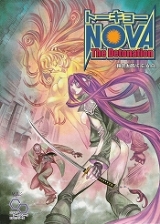
Tokyo NOVA
Encyclopedia
is a cyberpunk
role-playing game
with a long history in Japan. It is currently in its fourth edition: Tokyo NOVA The Detonation. It is possible to play stories in the cyberpunk
, hardboiled
crime fiction
, and contemporary fantasy
genres.
The setting is an alternate near-future Tokyo called "Tokyo NOVA", after a pole shift. Tokyo NOVA is a dangerous and attractive city.
Playing cards are used instead of dice in the Tokyo NOVA system. It is possible to perform a heroic action based on the player's selection instead of the capricious dice. The game is similar to Castle Falkenstein
, which Tokyo NOVA predates by a year. The suits of cards correspond to four abilities: Spade (♠) is reason, club (♣) is passion, heart (♥) is life, and diamond (♦) is mundaneness.
The styles that correspond to character classes represent not only the abilities and occupations of the characters but also ways of life. For example, the Kugutsu (Japanese for puppet
) style represents not only the job of a megacorp
's employee but also the character's unshakable loyalty to the company.
Cyberpunk
Cyberpunk is a postmodern and science fiction genre noted for its focus on "high tech and low life." The name is a portmanteau of cybernetics and punk, and was originally coined by Bruce Bethke as the title of his short story "Cyberpunk," published in 1983...
role-playing game
Role-playing game
A role-playing game is a game in which players assume the roles of characters in a fictional setting. Players take responsibility for acting out these roles within a narrative, either through literal acting, or through a process of structured decision-making or character development...
with a long history in Japan. It is currently in its fourth edition: Tokyo NOVA The Detonation. It is possible to play stories in the cyberpunk
Cyberpunk
Cyberpunk is a postmodern and science fiction genre noted for its focus on "high tech and low life." The name is a portmanteau of cybernetics and punk, and was originally coined by Bruce Bethke as the title of his short story "Cyberpunk," published in 1983...
, hardboiled
Hardboiled
Hardboiled crime fiction is a literary style, most commonly associated with detective stories, distinguished by the unsentimental portrayal of violence and sex. The style was pioneered by Carroll John Daly in the mid-1920s, popularized by Dashiell Hammett over the course of the decade, and refined...
crime fiction
Crime fiction
Crime fiction is the literary genre that fictionalizes crimes, their detection, criminals and their motives. It is usually distinguished from mainstream fiction and other genres such as science fiction or historical fiction, but boundaries can be, and indeed are, blurred...
, and contemporary fantasy
Contemporary fantasy
Contemporary fantasy, also known as modern fantasy or indigenous fantasy, is a sub-genre of fantasy, set in the present day. It is perhaps most popular for its sub-genre, urban fantasy.-Definition and overview:...
genres.
The setting is an alternate near-future Tokyo called "Tokyo NOVA", after a pole shift. Tokyo NOVA is a dangerous and attractive city.
Playing cards are used instead of dice in the Tokyo NOVA system. It is possible to perform a heroic action based on the player's selection instead of the capricious dice. The game is similar to Castle Falkenstein
Castle Falkenstein (role-playing game)
Castle Falkenstein is a steampunk-themed fantasy role-playing game designed by Mike Pondsmith and originally published by R. Talsorian Games. A GURPS version and several supplements were later published by Steve Jackson Games. The game is named for a legendary unbuilt castle in the Bavarian Alps...
, which Tokyo NOVA predates by a year. The suits of cards correspond to four abilities: Spade (♠) is reason, club (♣) is passion, heart (♥) is life, and diamond (♦) is mundaneness.
The styles that correspond to character classes represent not only the abilities and occupations of the characters but also ways of life. For example, the Kugutsu (Japanese for puppet
Puppet
A puppet is an inanimate object or representational figure animated or manipulated by an entertainer, who is called a puppeteer. It is used in puppetry, a play or a presentation that is a very ancient form of theatre....
) style represents not only the job of a megacorp
Megacorp
"Megacorporation" is a term popularized by William Gibson derived from the combination of the prefix mega- with the word corporation. It has become a term popularly used in cyberpunk literature...
's employee but also the character's unshakable loyalty to the company.

